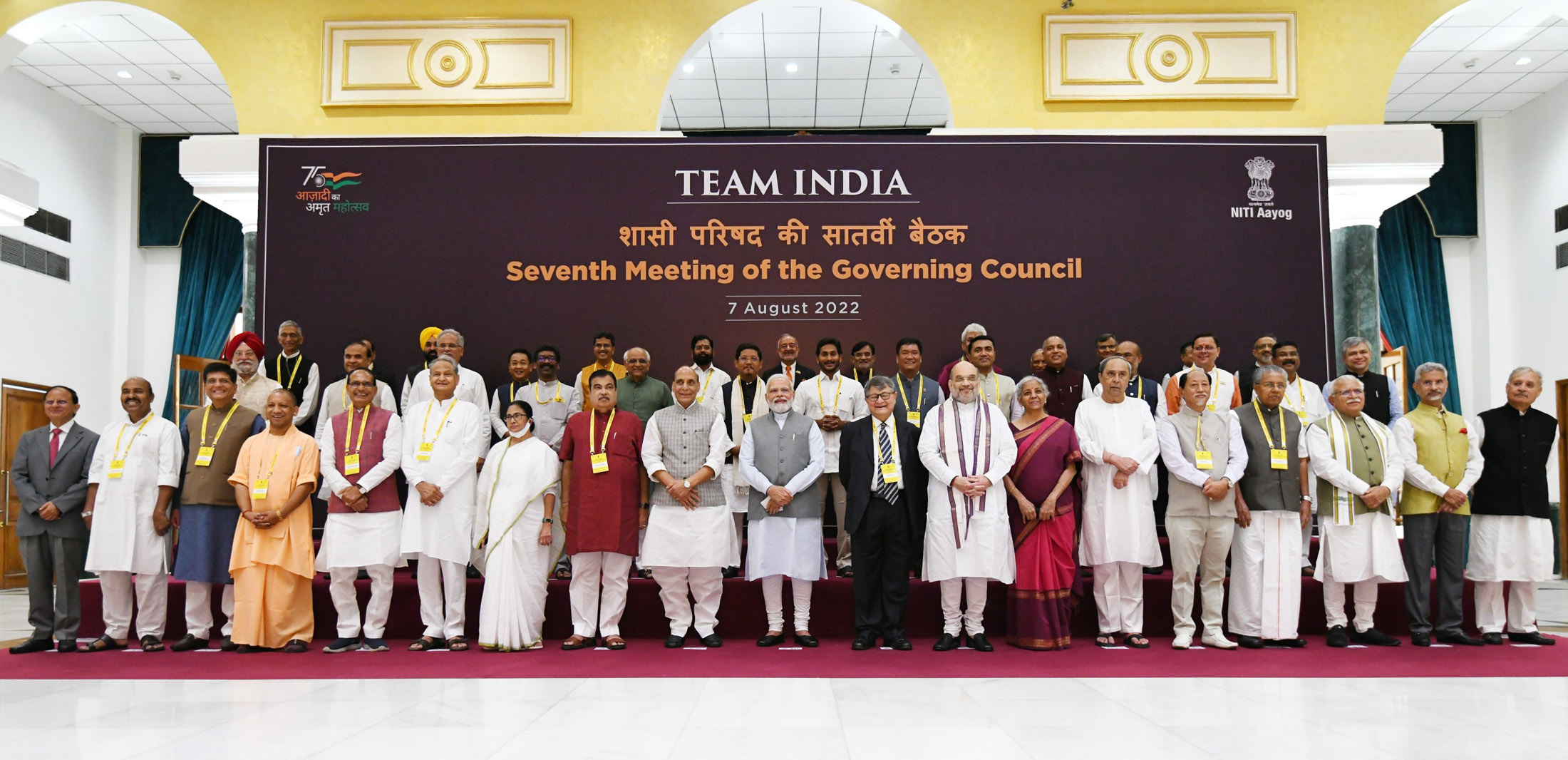Seventh meeting of Governing Council of NITI Aayog chaired by PM today
Collective effort & cooperative federalism helped India emerge from
the Covid pandemic: PM
G20 presents an opportunity for India to showcase the strength of its States: PM
The Prime Minister, Narendra
Modi, today heralded the collective efforts of all the States in the spirit of
cooperative federalism as the force that helped India emerge from the Covid
pandemic.
Addressing the seventh
meeting of the Governing Council (GC) of NITI Aayog, the Prime Minister said,
“Every State played a crucial role according to its strength and contributed to
India’s fight against Covid. This led to India emerging as an example for the
developing nations to look up to as a global leader.”
This was the first
physical meeting of the Governing Council since the onset of the pandemic, with
the 2021 meeting held via video conferencing. The meeting was attended by 23
Chief Ministers, 3 Lieutenant Governors and 2 Administrators and Union
Ministers. The meeting was moderated by Defence Minister Rajnath Singh.
In his inaugural
address, the Prime Minister said India’s federal structure and cooperative
federalism emerged as a model for the world during the Covid crisis. He said
that India had sent a powerful message to the developing nations of the world—that it is possible to overcome challenges with
resilience despite resource limitations. The PM said that the credit for this
goes to the State Governments, which focused on grassroots delivery of public
services to the people through cooperation across political lines.
The Prime Minister
highlighted that the seventh meeting was a culmination of months of rigorous
brainstorming and consultations between the Centre and States to identify
national priorities. “All Chief
Secretaries met together in Dharamshala and over three days, deliberated issues
of national importance. This collective process led to the development of the
agenda for this meeting," the PM said.
This year, the
Governing Council discussed four key agenda items:
(i) crop diversification and achieving self-sufficiency in
pulses, oilseeds and other agri-commodities;
(ii) implementation of National Education Policy (NEP) in school
education;
(iii) implementation of National Education Policy in higher
education; and
(iv) urban governance.
The Prime Minister
highlighted the importance of all of the above issues, especially the need for
India to focus on modernized agriculture, animal husbandry, and food processing
to become self-sufficient and a global leader in the agriculture sector. He said
rapid urbanization can become India’s strength instead of weakness by
leveraging technology to ensure ease of living, transparent service delivery,
and improvement in the quality of life for every citizen of urban India.
The PM also spoke
about India’s G20 presidency in 2023 and called it a unique opportunity to show
the world that India is not just Delhi—it is every State and Union Territory of
the country. The PM said we should develop a mass movement around G20. This
will allow us to identify the best talent available in the country. He also
said there should be a dedicated team for G20 in the States to derive the
maximum possible benefit from this initiative.
Speaking about
this, the Union Minister of External Affairs, S Jaishankar, said, “The G20
Presidency presents a great opportunity and a great responsibility. For the
first time in the history of G20, India will host the G20 meetings over the
year, not only in Delhi, but in every State and Union Territory.”
While highlighting
several initiatives undertaken to boost learning outcomes, capacity-building of
teachers, and skilling, Union Minister of Education, Dharmendra Pradhan,
thanked and requested further support of the States for the successful
implementation of the National Education Policy.
Vice Chairman, NITI
Aayog, Suman Bery, reiterated that India’s transformation has to take place in
its states. He reaffirmed the need for the combined efforts of the Centre and
States to realize the vision of a resurgent India post the pandemic.
Every Chief Minister
and Lt Governor present at the meeting addressed the meeting, highlighting the
priorities, achievements, and challenges of their respective States and Union
Territories with a special focus on the four key agenda items.
In his closing remarks, the Prime Minister said
that each state should focus on promoting its 3Ts, Trade, Tourism, Technology,
through every Indian Mission around the world. He said the
States must focus on reducing imports, increasing exports and identifying
opportunities for the same in every state. “We should encourage people to use
local goods wherever possible,” he said. ‘Vocal for local’ is not the agenda of
an individual political party but a common goal, he said.
The PM said even
though GST collection has improved, our potential is much more. “Increasing GST
collection requires collective action by the Centre and States. It is crucial
for strengthening our economic position and becoming a USD 5 trillion economy,”
he said. Speaking on the National Education Policy, the PM said the NEP has
been formulated after considerable deliberations. He said we should involve all
stakeholders in its implementation and develop a clear, timebound roadmap for
the same.
He expressed his
gratitude to the CMs and LGs for participating in the meeting and sharing their
views and experiences. He said NITI Aayog will study the states’ concerns,
challenges, and best practices and subsequently plan the way forward. He said
the issues discussed in this meeting will define the national priorities for
the next 25 years, adding that the seeds we sow today will define the fruits
reaped by India in 2047.
The Principal
Secretary to the PM, NITI Aayog Vice Chairman, Members and CEO, the Cabinet
Secretary, Secretaries (DoPT, Culture, DoSE&L, Higher Education
&MoHUA), Chief Secretaries of States and Union Territories, and other
senior officers from the PMO, Cabinet Secretariat, NITI Aayog attended the
seventh meeting.


